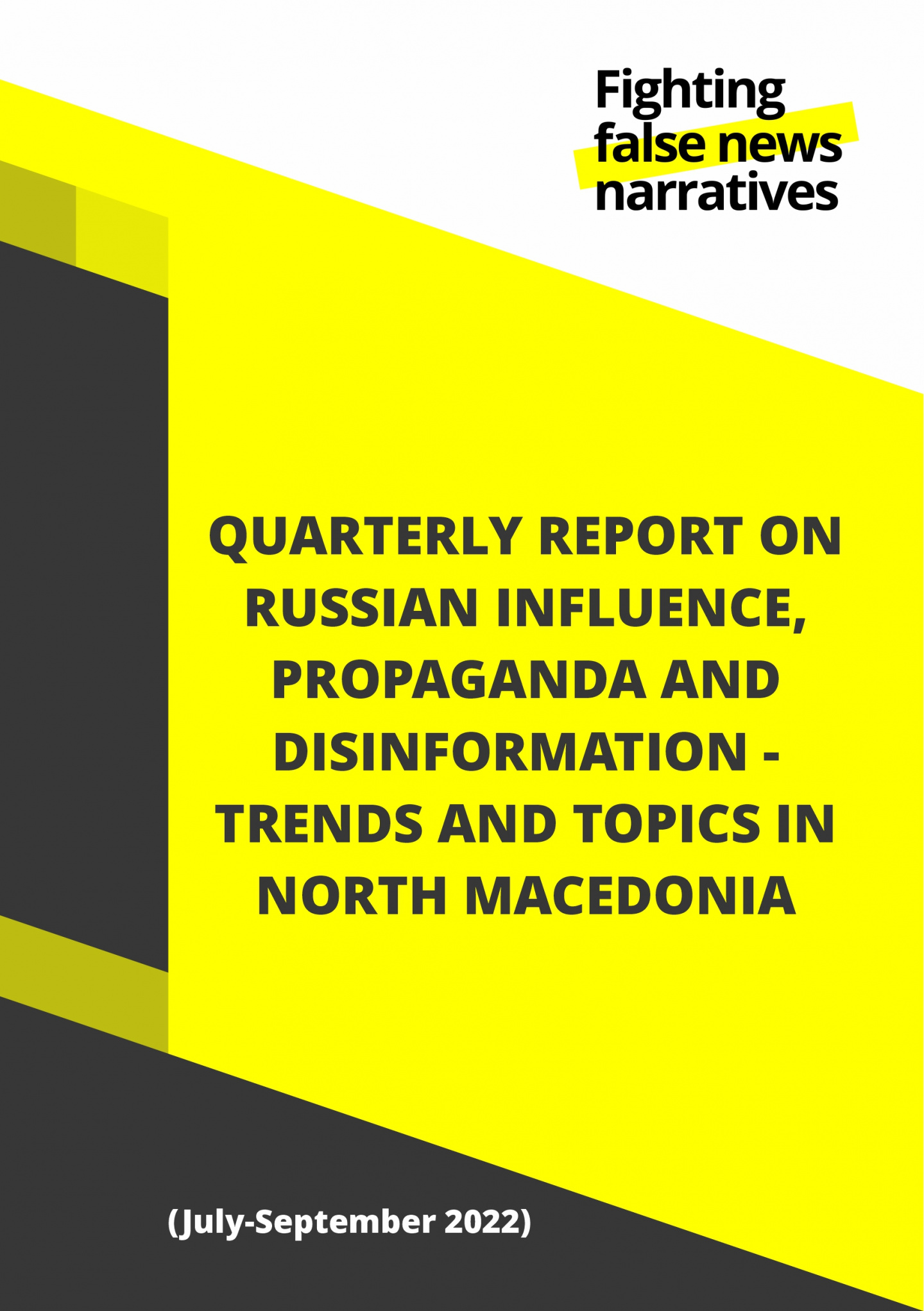Within this report, the narratives, to a certain extent, continued the overall story form the previous period with several modifications: The West was blamed that it wanted to destroy Russia because of its Orthodox worldview, while Ukraine was both losing the war and committing terrorist attacks against Russian civilians. Meanwhile, the narrative Sanctions hurt the West more than Russia continued to be promoted. Russia (and Belarus) continued to issue threats towards the West and the Balkans as well, while Russia and Putin were glorified, with the latter articles gaining much traction. Anti-Western narratives were directed against the EU and NATO, including by European officials, most notably, Hungarian PM Orban. The Balkans, mostly through the Kosovo issue, continued to be present in the statements of Russian officials.
The quarterly report analyses the major Russian propaganda, influence and disinformation narratives present in the online space in North Macedonia in the period October-December 2022.
A total of 1.515 articles and Facebook posts were recorded and analysed within this monitoring period. The articles were published by 126 websites and on Facebook, shared and amplified through 3.493 posts on 408 Facebook pages/groups, with a potential reach of 16.930.039 followers, and triggering a total of 134.960 interactions on Facebook.
A comparison with the previous report shows that while the number of articles, websites, posts and followers increased, the number of interactions decreased.

The average ratio of interactions per post has been constantly decreasing – 113,8 in Q1 (April-June), 101,2 in Q2 (July-Aug), and significantly decreasing in Q3 to 38,6 interactions per post, while conversely, the number of articles has been constantly increasing from 1.572 in Q1 to 3.493 articles in Q3.
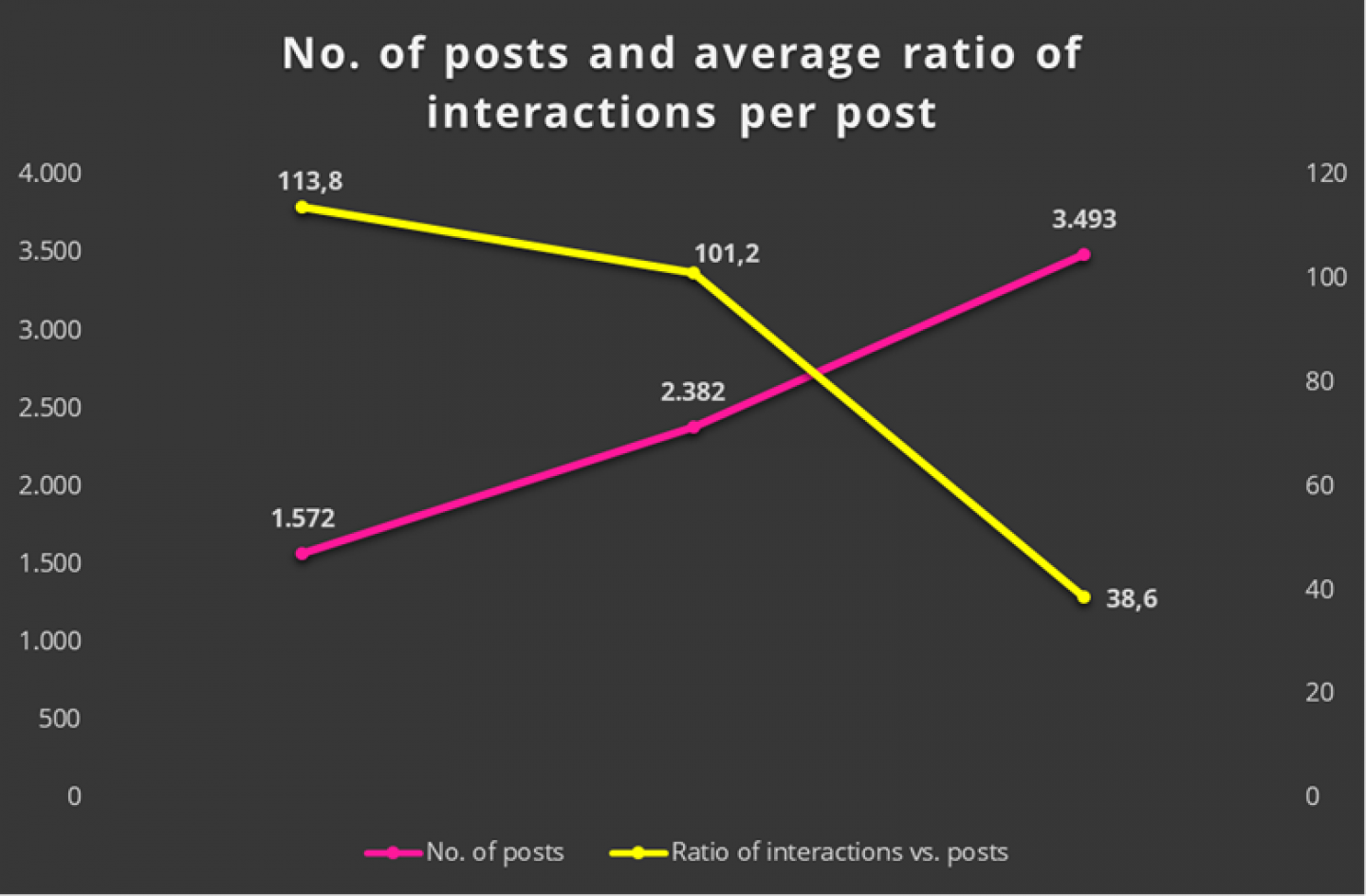
The narratives related to the Russian invasion on Ukraine were grouped under four general topics: (1) Events of Russia-Ukraine War (2) Economic Consequences of Sanctions, (3) Threats by Russia, and (4) Miscellaneous. Due to overlapping nature of the narratives within the topics, and tracking the regional context aside of the Ukraine war, two additional chapters were added elaborating the anti-Western narratives and the narratives with regional context.
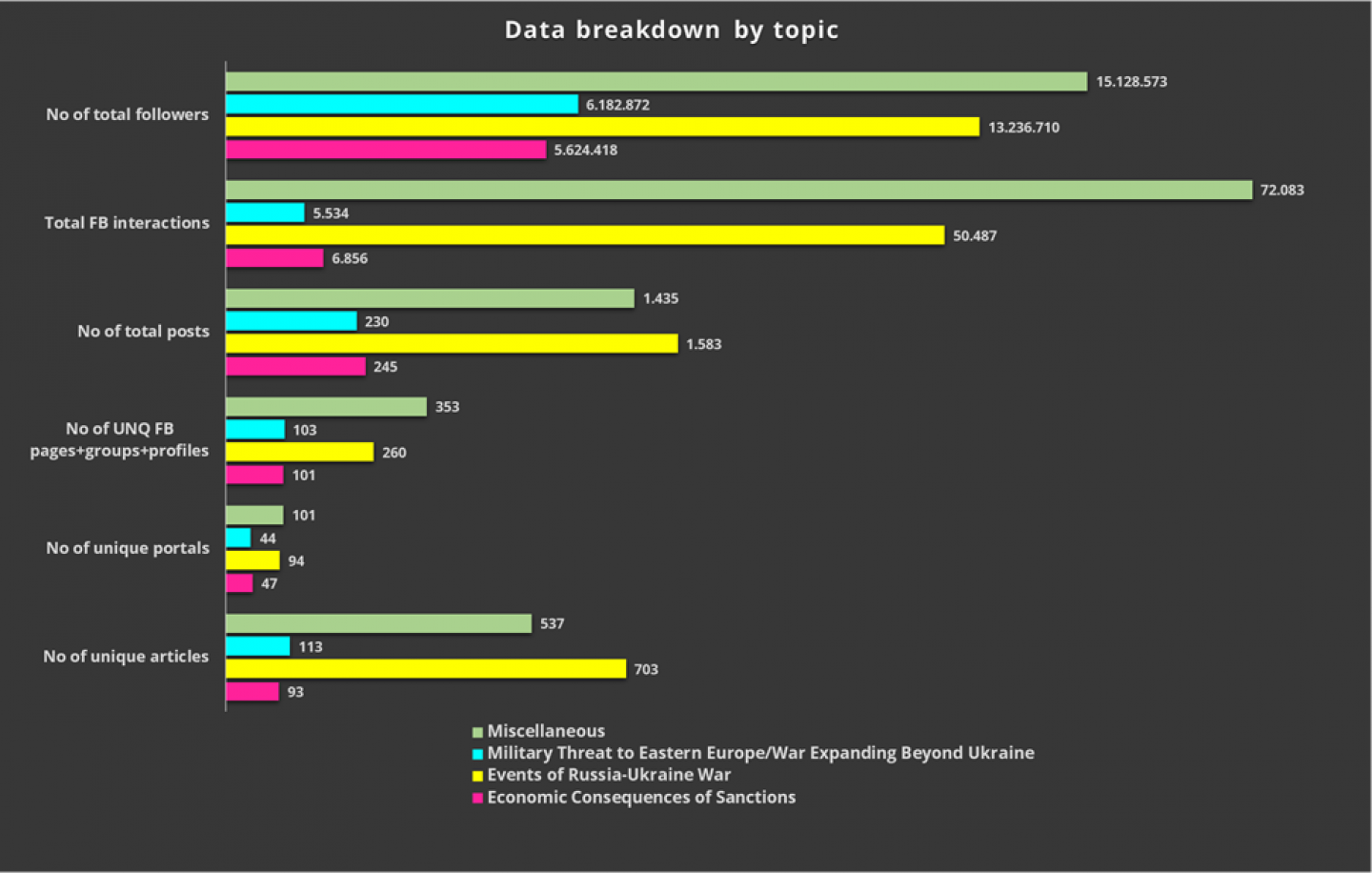
As it can be seen from the chart, there was again change in the dominance of the topics. While in the previous report, the dominant topic across all categories was Events related to the Russia-Ukraine War, in this report it was dominant in only two – number of articles and number of posts. The narratives within the Miscellaneous topic were dominant in all the other categories.
Within this report, the narratives, to a certain extent, continued the overall story form the previous period with several modifications: The West was blamed that it wanted to destroy Russia because of its Orthodox worldview, while Ukraine was both losing the war and committing terrorist attacks against Russian civilians. Meanwhile, the narrative Sanctions hurt the West more than Russia continued to be promoted. Russia (and Belarus) continued to issue threats towards the West and the Balkans as well, while Russia and Putin were glorified, with the latter articles gaining much traction.
Anti-Western narratives were directed against the EU and NATO, including by European officials, most notably, Hungarian PM Orban. The Balkans, mostly through the Kosovo issue, continued to be present in the statements of Russian officials.
Within this topic, there are three main narratives that were the most dominant for the period: (1) Ukraine is losing the war, (2) Ukraine is committing terrorist attacks against Russian civilians and (3) The West wants to destroy Russia because of its Orthodox worldview.
Events related to the Russian invasion of Ukraine
A total of 727 articles or Facebook posts were analysed. The articles were published by 94 websites and on Facebook, shared and amplified through 1.583 posts on 260 Facebook pages/groups, reaching 13.236.710 followers and triggering a total of 50.487 interactions on Facebook.
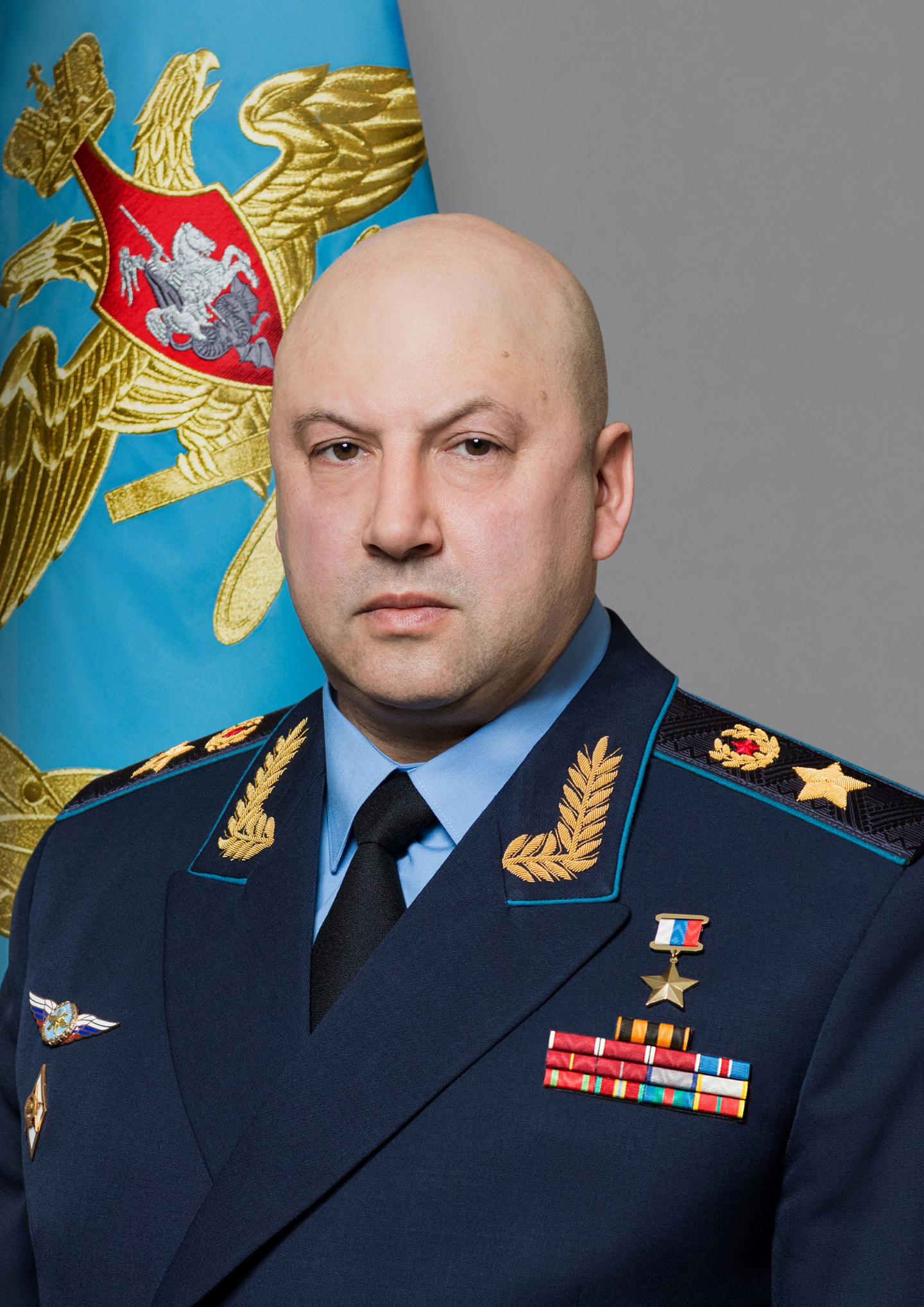
Sergey Surovikin - "General Armagedon" - Promoted and appraised by the portals in Nroth Macedonia
Although the narrative Ukraine is losing the war was present only in October, still it had the highest number of interactions within this topic. It was promoted through misusing statements by Ukrainian officials, through the articles reporting the appointment of the Russian General Surovikin as a commander of the Russian forces in Ukraine[1], as well as through articles about alleged Russian successes on the front. This narrative had an obvious aim – to defocus the public from the fact that the invasion had not, and still has not, fulfilled its objectives. Another aim was to promote the narrative The West is using Ukraine to wage war against Russia. Noteworthy for the context in North Macedonia was the fact that outlets reported on the alleged destroying of Macedonian tanks donated to Ukraine, some of them with headlines that expressed clear support to Russia, thus misusing a former claim by the Macedonian Minister of Defense, in order to strengthen the anti-Western sentiment.
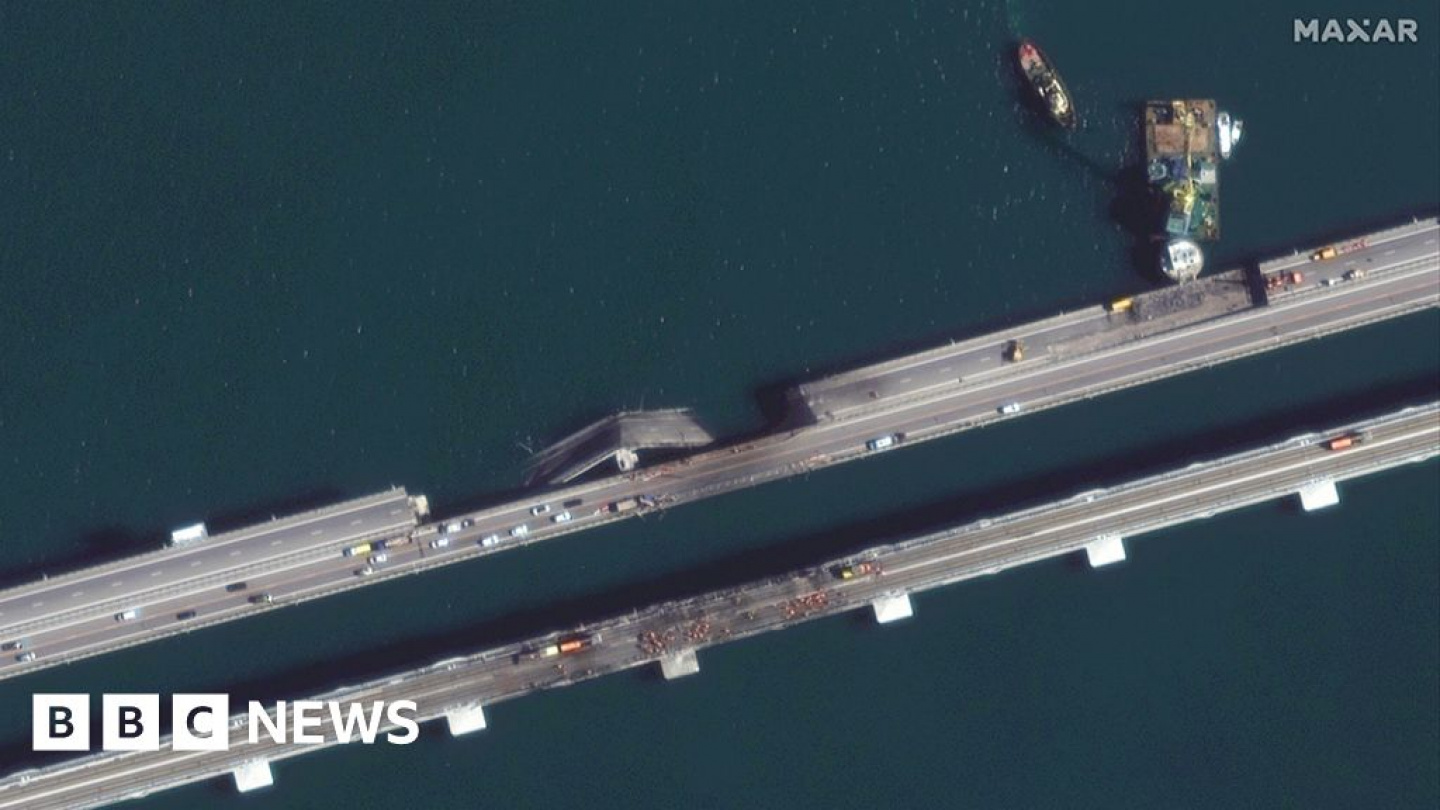
The Kerch straight "Crimea bridge" - Source: BBC
The narrative Ukraine is committing terrorist attacks against Russian civilians was also present only in October and it was mainly related to the destruction of the Crimean Bridge by the Ukrainian armed forces. Russian MFA spokeswoman Zakharova accused the Ukrainians for terrorism, while Russian President Putin warned Kyiv that Moscow will respond to the "terrorist attacks". Chechen leader Kadyrov also contributed to this narrative by blaming Ukraine for having committed terrorist attacks on civilians in Donbas since 2014. The narrative attempts to portray Russia as a victim, as a pretext for potential escalation of the war. This is another distortion that aims at creating the perception that (1) Crimea is Russian, therefore Ukraine performs terrorist attacks on Russian soil; and (2) Russia is a victim, regardless of the undisputable facts that it invaded a sovereign country, committed a number of war crimes (under investigation), and distorting the fact that only in the first month of the war it performed attacks on at least 1,500 civilian buildings, structures and vehicles, killing thousands of civilians.
The narrative The West wants to destroy Russia because of its Orthodox worldview was present in November, through claims by several Russian officials, as well as by Russian allies and propagandists. Deputy Chairman of Russian Security Council Medvedev said that Russia’s cause was righteous, since this was a holy battle against Satan. He also used the Muslim name of Satan, Iblis, which establishes a connection with the similar narratives promoted by Kadyrov. The latter appealed to the Muslims of Russia to unite and go out to fight against the Satanists in Ukraine, or, as he said, the troops of Iblis. Kremlin propagandist Dugin also touched upon this topic, concurring with Kadyrov that this was a jihad, a final, apocalyptic, holy war of the Orthodox Christian Rus, holy Rus, against the satanic West, or against the Antichrist. The narrative was also promoted by Russian Patriarch Kirill, who claimed that the West wanted to destroy Russia because Russian Orthodox worldview did not fit within the framework of the system that excludes God from people's lives. This is one of the narratives that attempts to justify the invasion and its potential escalation, seeing it as a battle between the “evil West” and the “righteous East”.
Economic consequences of sanctions
A total of 95 articles or Facebook posts were analysed. The articles were published by 47 websites and on Facebook, shared and amplified through 245 posts on 101 Facebook pages/groups, reaching 5.624.418 followers and triggering a total of 6.856 interactions on Facebook.
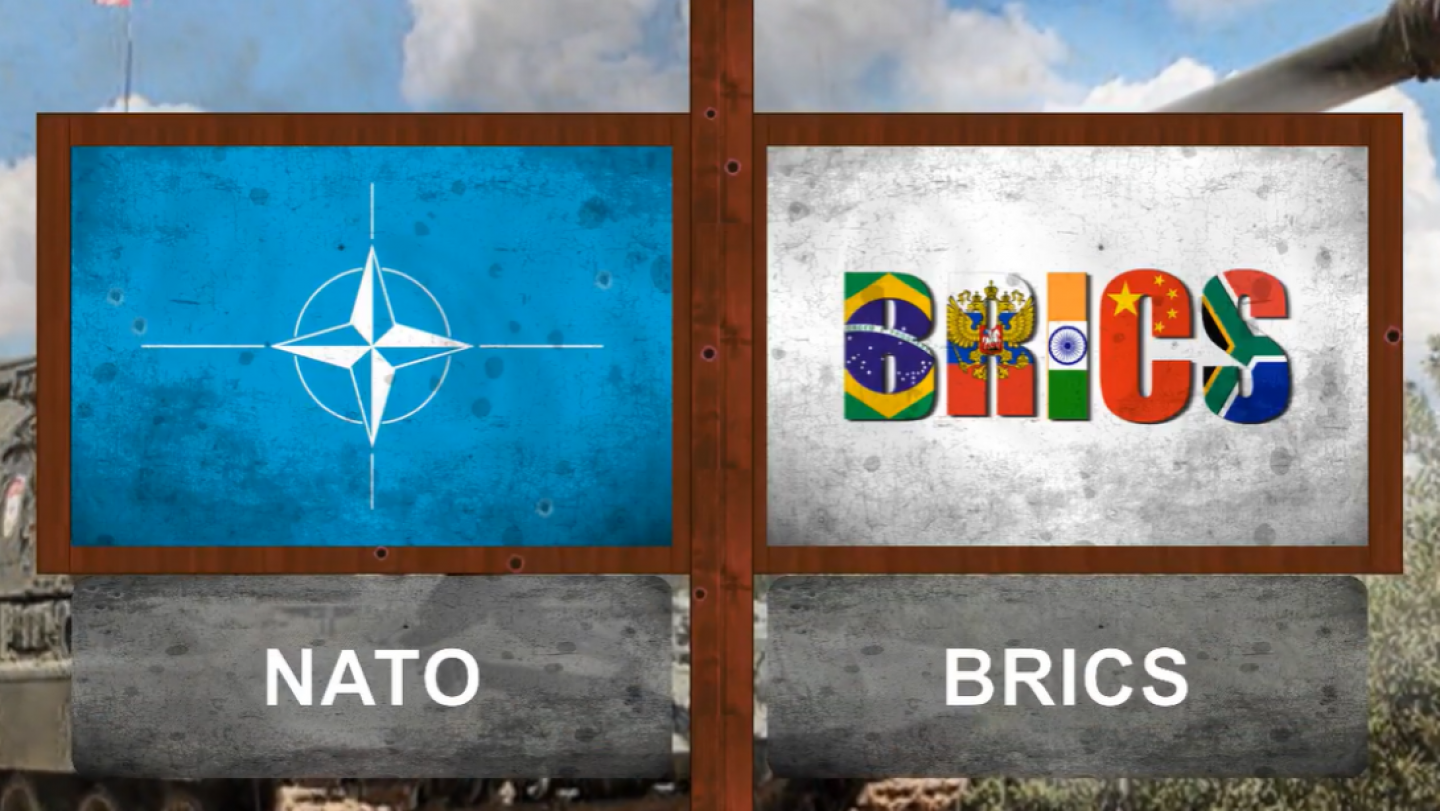
Source: Facebook
As in the previous report, there was one dominant narrative - Sanctions hurt the West more than Russia which has been present throughout the entire period. The narrative was promoted through articles that sanctions have failed, that they have not worked as Brussels had expected, or that they are more harmful to Europe than to Russia.
As it was the case in the previous report, Russian and Hungarian officials were involved in the promotion of this narrative. Medvedev claimed that the EU countries faced high inflation, while President Putin used a joke to imply that the sanctions are more harmful to Europe than to Russia. Hungarian officials (mostly Prime Minister Victor Orban) were claiming that the sanctions are ineffective or that they are harmful to Hungary, promoting the interest of the latter above the common interest of the democratic world – to oppose the aggression by all available means. Finally, a propagandistic video by Russia Today, depicting the celebration of Christmas in Europe for three consecutive years 2021-2023 also aimed to show that sanctions were hurting Europe more than Russia. The aim of the narrative was to show that Russia is strong and unaffected by the sanctions, despite the fact that independent sources confirmed that the sanctions were producing the desired effect.
Military Threats by Russia
A total of 113 articles or Facebook posts were analysed. The articles were published by 44 websites and on Facebook, shared and amplified through 230 posts on 103 Facebook pages/groups, reaching 6.182.872 followers and triggering a total of 5.534 interactions on Facebook.
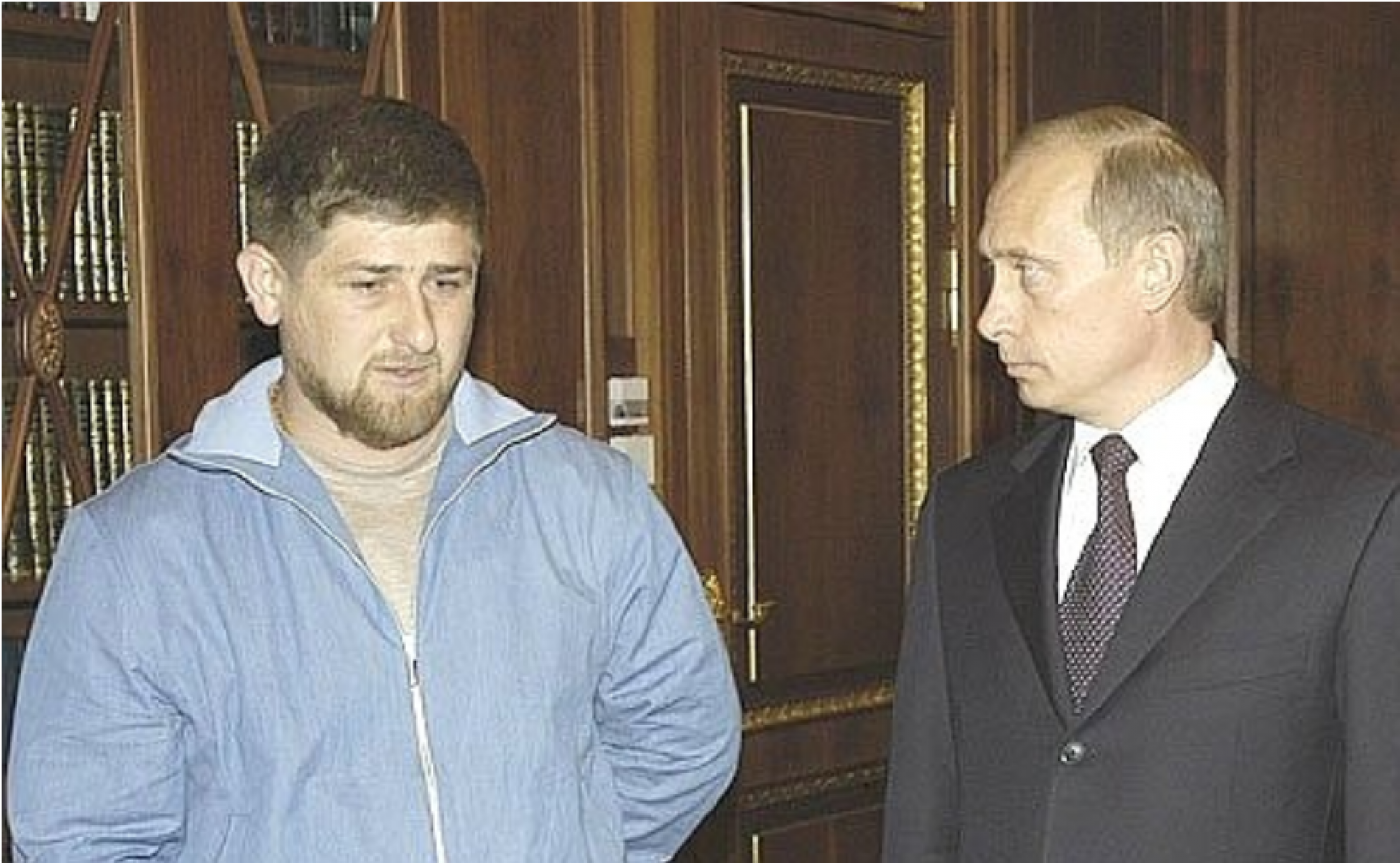
Putin and Kadyrov in Kremlin, May 2004, on the occassion of the death of Akhmat Kadyrov - Source: Kremlin.ru
Within this narrative there were threats by Belarus and threats by Russia, including nuclear ones. Belarus President Lukashenko said that Europeans did not want war, but their governments couldn’t put out the fire in their own house. He accused them that they wanted to start fire in Belarus as well, and threatened that “tomorrow, all of Europe will be set on fire." The trend of issuing threats towards the neighboring countries of Russia continued, with Russian philologist Nikolai Vavilov issuing threats toward Russia’s neighboring countries, Poland and the Balkans, by saying that “Russia will unite the neighboring countries in ‘one big Russian home’.” The nuclear threats included the statement by Medvedev that the eventual victory of Ukraine in the war would cause a new world war, the continuing promotion of the SARMAT missile, and the statement of the Minister of Defense Shoigu that in 2023 Russia would pay special attention to building infrastructure for its nuclear forces.
Glorification of Russia
Narratives that glorified Russia were (1) Glorifying Putin and (2) Russia and its allies are strong. The first was the most engaged narrative due to the fact that in October Putin celebrated his 70th birthday, so that was an occasion to transmit the congratulations sent from various autocrats, Russian Patriarch Kiril, as well as from local pro-Russian voices – some of them with strong anti-Western sentiment. This was the case with the highest number of articles (97), websites (54), Facebook posts (223) and interactions (18.534) within the entire report. It is important to find the answer to the dilema what is the 'public interest' in covering the birthday of Putin to this extent.
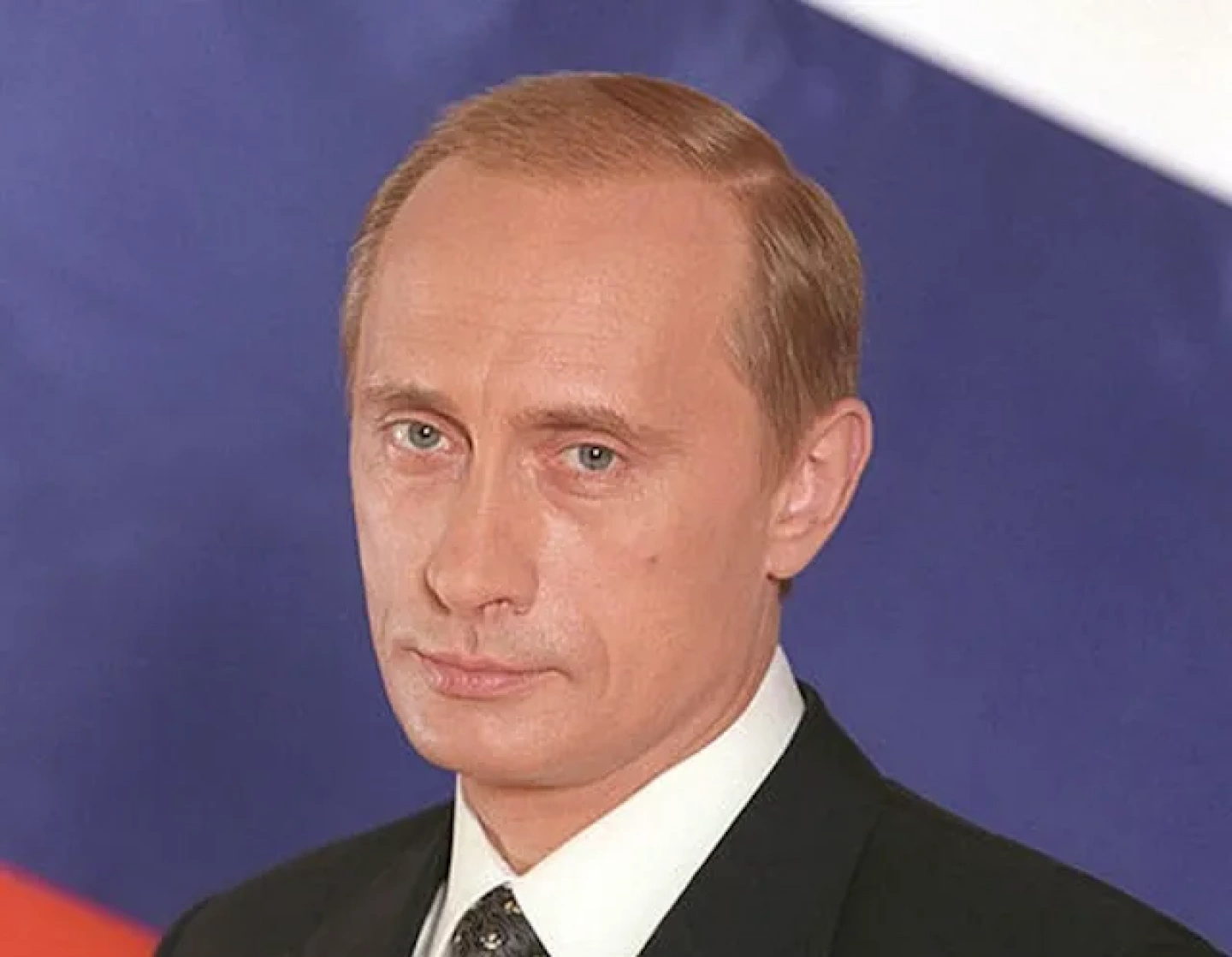
Vladimir Putin in 2002 - Source: Kremlin.ru
The narrative Russia and its allies are strong was mostly promoted through articles related to Chechen leader Kadyrov. Thus, he announced that he will send his three sons who are minors, to the front, and later it was reported that they have arrived in Mariupol. Later, after Ukraine issued a warrant against him, Kadyrov said that there was no need to put him on the list of wanted persons and issue a warrant, stressing that he would have come on his own. The frequent appearance of Kadyrov in the online space in North Macedonia aims at presenting him as a loyal Putin’s ally and a “fierce” and “strong” warrior, being in charge of the masculine segment of the Kremlin propaganda. Continuing the narrative about Kadyrov, Russian President Putin awarded the title “Heroic Mother” to his spouse and “met” with the mothers of the Russian soldiers, in an attempt to portray him as someone who shows respect for the mothers, to boost mobilization of new soldiers and to dampen the resentment from the unsuccessful “three-day” war. There were credible reports that the meeting with the mothers was staged, and was attended by hand-picked party activists or agents of the FSB.
Aggrandizing Russia and its military capabilities continued through the promotion of a “new” Russian laser weapon Peresvet that could allegedly bring down satellites. The article was published by a recently launched anonymous outlet. However, the weapon has been already promoted in 2018. In addition, the same weapon was one of the most promoted features on the Victory Day parade in 2019, as reported in the Macedonian online space. This continues the trend of Russian propaganda to announce the same weapons several times, thereby keeping the narrative alive, while in reality Russian weapons in Ukraine were described as “ineffective”, “obsolete” and “not meeting modern requirements”. Medvedev claimed that Russia ramped up production of all types of weapons, even though previously independent sources noted that Russia struggled to replenish its troops in Ukraine with weapons and ammunition, as well as other types of military equipment.
Anti-Western narratives
Narrative against the Euro-Atlantic integration was promoted in a post on the Facebook page “Ludata Joci Fan Klub”. The post was critical of the Euro-Atlantic integration, saying that North Macedonia allegedly sold its sovereignty to the EU and NATO and there was an alternative to the Euro-Atlantic integration, alluding to the narrative Multipolar world. The post also implies that allegedly the EU and NATO will be complicit in the erasing of the Macedonian identity, therefore promoting the narrative The West is against North Macedonia. The post concludes with the Bojkotiram slogan “Never North, only Macedonia”. A photo accompanies the post in which two vultures with the flags of the EU (with swastika) and NATO (named Nazi Aggressor Terrorist Organization) are eating upon a map of North Macedonia, with the Vergina sun overimposed on its territory. This narrative was also promoted through a recycled statement of Lavrov from July 2022 in which he said that “Macedonia changed its name to enter the EU and was not accepted and will not be accepted in the near future. The EU and NATO are trying to turn Macedonia and Montenegro into ‘tools’ of the anti-Russian game, just as they tried to do with Ukraine and a number of other Eastern European countries”. The technique of recycling articles and narratives by domestic pro-Russian actors and voices continues.
It is interesting that another narrative against the EU and NATO, The EU and/or NATO and/or the West are weak and will break apart, was promoted by Hungarian PM Orban. Commenting the sanctions against Russia he said that EU policies were directed towards Hungary, but he was not afraid, since the EU would face a similar fate as the Soviet bloc did in 1991. Almost all of the public appearances of Orban were about criticizing the sanctions against Russia, thus making an attempt to create a perception of disrupted unity within the EU on this matter.
Narratives with regional context
The tensions in the Kosovo-Serbia relations continued to be high on the event agenda and a pretext for the heavily presence of Serbian President Vučić in the Macedonian online space during this period as well. Thus, in October, he was present through the news with a bombastic headline “Vučić will build a gas pipeline from Serbia to Macedonia,“ which was the top second case according to the number of interactions (9.689). However, from the text of the article it was obvious that Vučić spoke that an interconnector should be built between Serbia and North Macedonia supported by the EU, and not that “he” or Serbia will build an entire gas pipeline. This is a continuous narrative that was also present in the past, when Vučić gave a similar statement on the occassion of the commencement of works on the Alexandroupolis LNG terminal in May that was also distorted, thus creating an image of Serbia’s mightiness and Vučić’s leadership in the region.
The narrative Kosovo is Serbia was present as well, through Vučić’s statement that Serbs from Kosovo would not accept to be punished if they did not change their registration plates, and if Kosovo special security forces participated in the enforcing of this decision, there would be hell.
Aleksandar Vučić and Turko Daudov - Special envoy of Ramzan Kadyrov in Belgrade, November 2022. Soruce: Vucic.rs
Russian officials also used the pretext of the tense situation between the two countries to stress that Russia stands in solidarity with Serbia in regards to Kosovo. There were several statements that there can be no long-term solution of the Kosovo issue (headlined “We cannot escape from war”), and that Russia and Serbia could unite. Russian MFA spokeswoman Zakharova blamed “radical” ethnic Albanian authorities and their “Western sponsors” for the situation. According to her, the authorities in Pristina had undertaken a “series of provocations” with the connivance of the US and the EU, using “ethnically motivated violence” to target the remaining Serbs in the province. Finally, Kremlin spokesman Peskov said that all rights of Kosovo Serbs should be protected and that the most important thing for Russia was to secure the interests of the Serbs.
Statistics
Top 5 stories by number of articles, reach and interactions

Top 10 websites by number of articles and top 10 Facebook pages/groups by number of posts (articles)
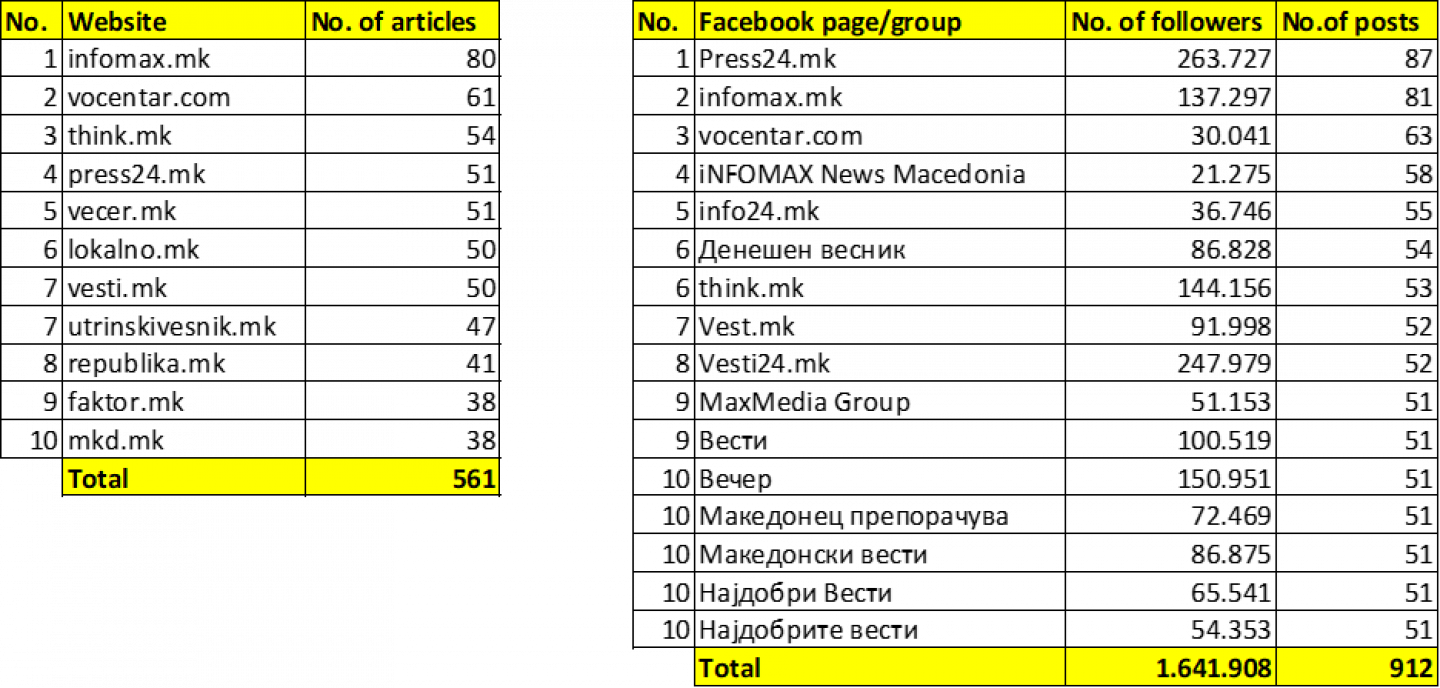
The top 10 websites or 7,9% of the total number of websites, published 38,8% of the total number of articles (561 out of 1.446).
The top 14 Facebook pages/groups (3,4% of the total number of Facebook pages/groups) posted 26,1% of the total number of posts [912 out of 3.493 posts (articles)].
Authored by FN team
References
[1] Relieved from duty on 8 January, 2023.

